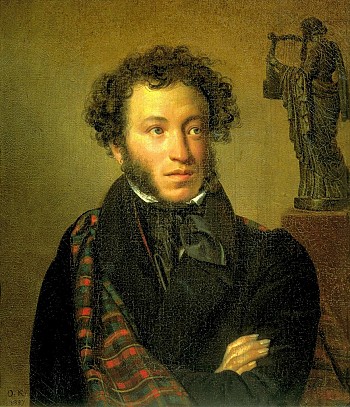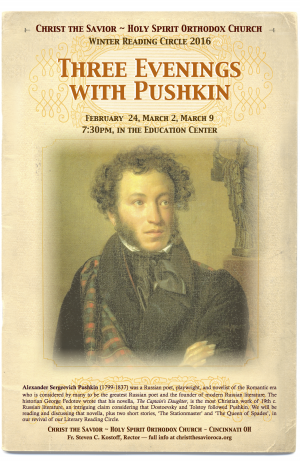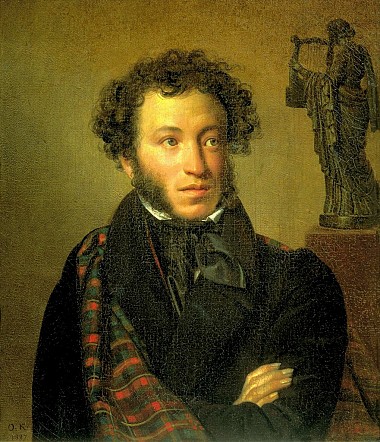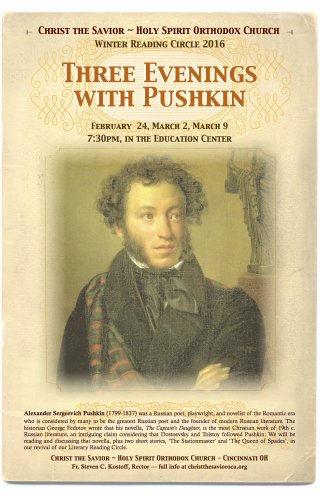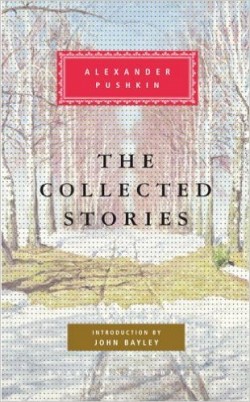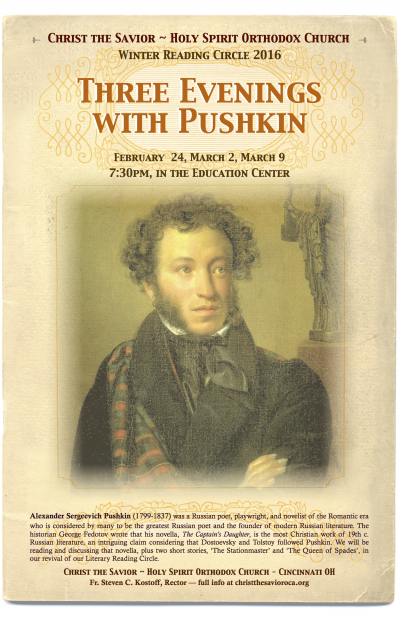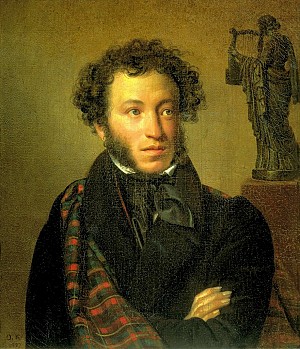Dear Pushkin Readers,
I would like to follow through on our now-completed "Three Evenings With Pushkin" with a couple of items:
In our discussion concerning "The Shot" we spoke about the phenomenon of dueling in the 19th c. and got around to the issue of Pushkin himself as a dueler. Of course, we know of Pushkin being killed in a duel (1837) and the height of his artistic powers. But reading through a Pushkin biography, I came across the startling statement:
"His amorous adventures, biting wit, and keenly felt sense of personal honor involved him in about twenty duels (emphasis added) during this period (1820-1824) - all bloodless, some even jocular."
Accoding to a Pushkin's friend, a certain Colonel Liprandi: "When the time came to take his paces, he seemed cold as ice."
And for those who read "The Shot," his biographer Julian Lowenfield writes: "In one duel, while his opponent was aiming and firing at him, Pushkin calmly ate ripe cherries, then cast away his gun!" Not as fictional a detail as one may think when reading "The Shot!"
Another dueling opponent said of Pushkin: "You stand up to bullets as well as you write."
Reckless bravado was apparently a male virtue of that age...
____
Concerning a second item, this time in relation to "The Blizzard:" I hesitated when asked about the "marriage in the dark" which is at the heart of the sudden and astonishing end to this tale. Were the two protagonists truly married even in this unlikely case of mistaken identity?
Having thought that over a bit, I need not have hesitated, but said that they must have been considered married, distasteful, or at least, difficult, as that may seem to us today. The description of the service was very brief and not even that accurate (in our English translations).
Nevertheless, though ignorant and "deceived" as she was, our heroine stood by her "groom" voluntarily; the priest must have crowned them, even if the service was abbreviated, though no mention of that. So, they both left the dark church as "man and wife."
There is an "objectivity" to the Sacraments of the Church which protects the faithful from being the uncertain participants in the vagaries of subjectivism. Of course, a canon law expert or even a bishop may come to the conclusion that such a marriage is non-binding. And that may very well be a pastoral decision. Since we do not have "annulments" I am not sure how that would work itself out, though. But I would now argue that the two were married and that the husband found his wife at the end of the story!
Not exactly material for the First Week of Great Lent, but I started working on this last week, and just didn't quite get the opportunity to finish it until now!
A further note: I just read a more extended description of Pushkin's final duel and subsequent death. All accounts are that he died in a truly Christian manner, forgiving everyone - including his dueling foe and his capricious wife - while suffering through an excruciating final forty-six hours before his death.
I really enjoyed our three evenings with Pushkin and am looking forward to our next Reading Circle!
Fr. Steven
Dear Pushkinians,
For the last of our "Three Evenings With Pushkin," we will conclude our discussion of The Captain's Daughter and then discuss two more short stories: "The Shot" and "The Blizzard", or is it "The Snowstorm?" I forgot the translation in our particular volume.
Looking forward to it!
Fr. Steven
Dear Readers,
The attachment is for those who will participate in the reading circle tomorrow evening, March 2.
Fr. Steven
The Captain's Daughter - Notes and Questions (PDF)
The Captain’s Daughter - Notes and Questions
Principle Characters
Pyotr Andreevich Grinev – aspiring Guards officer (sixteen yrs. old when the novel begins).
Savelitch – his personal servant
Captain Ivan Kuzmich Mironov – commander of Belogorsk
Vasilisa Egorovna – his wife
Maria Ivanovna – their daughter; the “Captain’s daughter”
Lieutenant Shvabrin – a traitor
Emelyan Pugachev – Don Cossack and leader of rebellion 1773-1775 in southeast Russia. By faith, an “Old Believer.”
Note on the Cossacks: “The Cossacks, of whom there were several groups, lived mainly in the Ukraine, on the lower Don and on the Yaik River. Their role was to defend the Russian frontier. Being fine horsemen and good fighters, they were allowed to retain certain democratic liberties. Several rebellions, including those led by Stenka Razin and Pugachev, were supported mainly be Cossacks. After the suppression of the Pugachev rebellion … the Cossacks lost their liberties but came to form an important part of the Tsarist army.” (Robert Chandler)
Themes & Questions
The Russian cultural historian, George Fedotov, once remarked that The Captain’s Daughter is the most Christian work in all of Russian literature. Yet, Pushkin scholar and translator, Paul Debreczeny, writes that: “Most elements of the plot are so obviously melodramatic as to suggest parody.” Which position would you tend to support and why? Are these two positions irreconcilable?
Who actually narrates the novel?
The story turns on a number of gifts and their unexpected consequences. Perhaps we should discuss some of the more important of these gifts. What of the hare-skin coat that Pyotr gives to an unknown peasant at the beginning of the novel? How significant is that “gift” for the future of the unfolding narrative of the novel?
The Captain’s Daughter has been called a historical novel, an epistolary novel, even a fairy tale. Are features of these three genres discernible in the novel?
Even though the novel has a horrific rebellion as its backdrop there is not a great deal of actual violence recorded. The one great exception is the execution of Captain Mironov and his wife. How pivotal is the scene of their death for the novel as a whole?
How believable of a character is Maria Ivanovna? What are her main character traits?
An interesting historical point is that as Pugachev is actually a pretender to the throne of Russia, Catherine the Great, was a German who usurped the throne when her husband, Pyotr III, was murdered.
Dear Readers,
I would have a hard time over-stating how much I enjoyed yesterday evening's Session I of our "Three Evenings With Pushkin." We had both a lively group and an even livelier discussion about two short masterpieces from the hand of Pushkin. I learned a great deal, and had many new insights into these stories based on the comments of others. I will look forward to our further discussions on Pushkin's novel The Captain's Daughter.
If you have the volume of his Collected Prose Works, translated by Debreczency, you will notice that following The Captain's Daughter, there is a work of historical scholarship that Pushkin actually wrote before the novel, entitled A History of the Pugachev Rebellion. The novel is a fictionalized account of the era based on the intensive research Pushkin put into his historical study. I mention this because it is a great work in its own right, and that it can illuminate the novel quite a bit. If you have the time! I will make a few brief introductory comments on the History.
I believe that we still have a few more things to say about The Queen of Spades, so we will begin there next Wednesday evening. Hope you plan on returning!
Three! Seven! Ace!
Fr. Steven
Winter Reading Circle 2016 ~ Three Evenings with Pushkin
Session I: Wednesday, February 24, 7:30pm, in the Education Center
For this coming Wednesday, February 24, everyone in the Reading Circle should read "The Stationmaster" and "The Queen of Spades" by Pushkin.
I would suggest reading the Introduction to the Collected Works of Pushkin (if that is the volume that you have) by John Bayley, an excellent scholar of Russian Literature. This will lend some insight to Pushkin's life and goals in his prose writing. We are trying to discern any of the moral and ethical issues raised by these stories.
Linked below are some questions that we may find helpful in stimulating our discussion.
~ Fr. Steven
• Study Questions for Pushkin, Session 1
Join us for our 2016 Winter Reading Circle
THREE EVENINGS with PUSHKIN
Wednesday evenings at 7:30pm in our Education Center
February 24, March 2, March 9
Alexander Sergeevich Pushkin (1799-1837) was a Russian poet, playwright, and novelist of the Romantic era who is considered by many to be the greatest Russian poet and the founder of modern Russian literature. The historian George Fedotov wrote that his novella, The Captain's Daughter, is the most Christian work of 19th c. Russian literature, an intriguing claim considering that Dostoevsky and Tolstoy followed Pushkin. We will be reading and discussing that novella, plus two short stories, ‘The Stationmaster’ and ‘The Queen of Spades’, in our revival of our Literary Reading Circle.
Link to order the edition of Pushkin's works we will be using:
Pushkin - Collected Stories (Everyman's Libary)
Download our flier in printable PDF format...
Speaking with a few parishioners, and hearing a suggestion or two, I am thinking of reviving our Parish Reading Circle in the near future.
The Reading Circle concentrates on a renowned work of literature as we read it for the sheer pleasure of enjoying good writing, but also for the moral and ethical issues raised in any given story/novella/novel. Someone suggested to me, something like "Pushkin in translation." If we follow up on that, I have in mind The Captain's Daughter, a novella by the great Russian poet and prose writer Alexander Pushkin (+1837). Also, perhaps, one or two of his most famous short stories.
The historian George Fedotov wrote that this is the most Christian work of nineteenth c. Russian literature, an intriguing claim considering that Dostoevsky and Tolstoy followed Pushkin. Please let me know if you would be interested and I can then determine if we have enough committed readers to make it a worthwhile parish project. If so, we would probably schedule a couple of sessions toward the end of February, and before the beginning of Great Lent.
-- Fr. Steven
January 11 follow-up from Fr. Steven:
There has been a very good response to a tentatively-planned Parish Reading Circle, which means that we will go ahead with it. I will set up three sessions in late February. Please let me know if you would also like to join. Our focus will be: "Pushkin in Translation."
Watch for updates soon!

